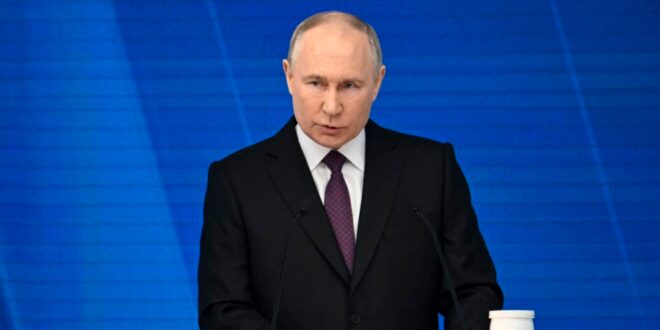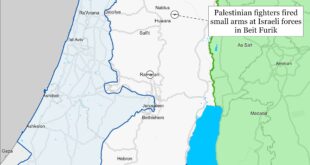The day before Vladimir Putin’s long yearly address to parliament Thursday, politicians from Transnistria, a pro-Kremlin breakaway region of Moldova, asked the Russian president to “protect” it against Moldova’s “increased pressure” — and Moscow responded it considers protecting its “compatriots” a priority.
It’s a reminder Putin’s ambitions don’t stop at Ukraine.
As Russia’s war enters its third year, Kyiv fights for its survival with American aid stalled in Congress.
It’s brought Putin’s ambitions in Europe one step closer to reality: undermining Ukrainian independence, weakening the European Union and NATO, returning Russia to its pre-1991 border and installing pro-Russian governments in Europe.
All of this amid a backdrop of Russia preparing for a war with the West, as Estonia’s Foreign Intelligence Service has warned.
Putin possesses the will but lacks the might to accomplish his imperialistic goals.
He’s not a military man, though, but a former KGB officer who specializes in exploiting his opponents’ weaknesses.
His focus is now on two European vulnerabilities: Moldova and the Balkans.
He’s exploited tensions in these regions to destabilize them, diverting Western attention and resources from Ukraine.
Moscow seems particularly intent on punishing Moldova, a small nation wedged between Ukraine and Romania, for its political independence and refusal to align with Russia.
The Kremlin “inspired” Transnistria, located on a thin strip of land between the Dniester River and Moldova’s border with Ukraine, to declare independence two decades ago, which Russia recognized.
Transnistria is a focal point for Putin’s games as he can easily escalate a crisis there due to the presence of Russian troops and Russian citizens.
Russian Foreign Minister Sergey Lavrov informed the Duma the Kremlin is concerned about the “fate” of the 200,000 citizens living in Transnistria, as it doesn’t want them to “become victims of another Western adventure.”
Lavrov also warned Moldova it would be “the next victim in the hybrid war that the West unleashed against Russia.”
Vadim Krasnoselsky, Transnistria’s Russian-backed leader, last month called for an increase in military drills and heightened readiness.
One of Europe’s poorest countries, Moldova has struggled to overcome Russia’s provocations.
The Kremlin also attempted to overthrow the government and reverse Moldova’s EU aspirations, using energy blackmail by cutting natural-gas deliveries from Russian energy giant Gazprom.
The Balkans is another place Putin can unleash his playbook of chaos and incite unrest in the region via his proxies.
Ukrainian President Volodymyr Zelensky has warned the world: “Pay attention to the Balkans. Believe me, we are receiving information: Russia has a long plan.”
Sergey Lavrov also advised that events in the Balkans are leading to a “major explosive situation” in “the heart of Europe.”
Three decades after Yugoslavia’s bloody breakup, recent clashes between Serbia and Kosovo have reignited lingering ethnic tensions.
The Serbian president used rhetoric similar to Putin’s when he accused the Kosovo government of “ethnic cleansing” of Serbs.
The White House warned in September of a “large Serbian military deployment along the border with Kosovo” after 30 heavily armed Serbs stormed a Kosovo village, resulting in the death of three attackers and one Kosovan police officer.
Last year, more than 90 NATO peacekeeping soldiers were injured in clashes with Serb protesters in northern Kosovo.
Russia sees this region as Europe’s soft underbelly and is employing information operations to inflame ethnic tensions, encourage protests and cement arms deals.
Despite NATO’s peacekeeping mission in Kosovo, Russia’s meddling, even through proxy groups, is brazen.
A dangerous crisis is also brewing in Bosnia and Herzegovina.
Milorad Dodik, the pro-Russia president of the country’s Serb Republic, met Putin last week to strengthen ties with Moscow.
Dodik’s separatist rhetoric and threats to secede align with Putin’s goals, with the Russian leader awarding him the Order of Alexander Nevsky for “strengthening the partnership.”
Putin perceives the European Union Force in Bosnia and Herzegovina as weak and unwilling to act in case of separatist movements.
Putin has bet big that the West, when pushed, will end up losing interest in his ventures in the Balkans, the Baltics, Moldova, Ukraine and Poland and renege on its promises — which would allow Russia and its allies to begin dividing the world among themselves.
To achieve this, the Kremlin hopes its current efforts to stoke up conflict in these regions will force global leaders, who depend on the West for security, to realize they have only a paper tiger guaranteeing their security.
 Eurasia Press & News
Eurasia Press & News



